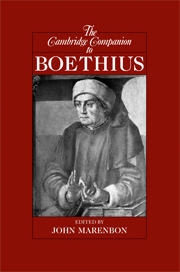Book contents
- Frontmatter
- Introduction: reading Boethius whole
- Part 1 Before the Consolation
- Part II The Consolation
- 8 The Good and morality: Consolatio 2-4
- 9 Fate, prescience and free will
- 10 Interpreting the Consolation
- 11 The Consolation: the Latin commentary tradition, 800-1700
- 12 The Consolation and medieval literature
- Appendix: Boethius’ works
- Bibliography
- Index: References to Boethius' works
- General Index
- Series list
8 - The Good and morality: Consolatio 2-4
from Part II - The Consolation
Published online by Cambridge University Press: 28 July 2009
- Frontmatter
- Introduction: reading Boethius whole
- Part 1 Before the Consolation
- Part II The Consolation
- 8 The Good and morality: Consolatio 2-4
- 9 Fate, prescience and free will
- 10 Interpreting the Consolation
- 11 The Consolation: the Latin commentary tradition, 800-1700
- 12 The Consolation and medieval literature
- Appendix: Boethius’ works
- Bibliography
- Index: References to Boethius' works
- General Index
- Series list
Summary
FORM AND CONTENT
Readers coming to the Consolatio for the first time are bound to be struck by a certain formal consideration that serves to set Books 2-4 apart from Books 1 and 5: whereas each of the three central books begins with prose and ends with poetry, Book 1 both begins and ends with poetry as Book 5 does with prose. Books 2-4 in fact highlight the shift in balance from poetry to prose by holding the two in strict equilibrium. This element of formal coherence goes hand in hand with a unity that over the course of the central books obtains at the level of a fundamental literary and philosophical motif, that of the circle or orb. The motif appears in the first two chapters of Book 2 in the form of Fortuna's wheel, whose spinning symbolizes the constant mutability of human life and seasonal change, and it re-emerges in the penultimate chapter of Book 4 in the figure of the nested orbs of fate. That we are in each case considering one and the same reality is evident both from the fact that the final chapter of Book 4 takes a last look back at fortune in its popular or vulgar sense, and from the dramatic irony and foreshadowing with which 2.1 is brought to a close: “Would you halt the movement of [Fortuna's] spinning wheel? But fool! The moment it stops, it ceases to be fortune.” For fortune, as becomes clear at the end of Book 4, is nothing more than a common misconception for fate, which is in turn the ordered temporal change that emanates from immutable providence.
- Type
- Chapter
- Information
- The Cambridge Companion to Boethius , pp. 181 - 206Publisher: Cambridge University PressPrint publication year: 2009
- 31
- Cited by

